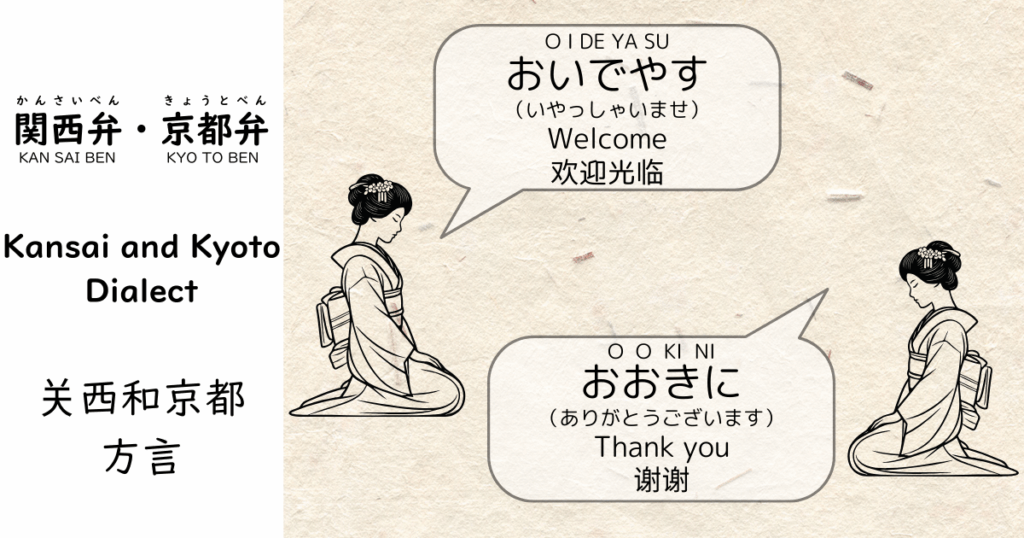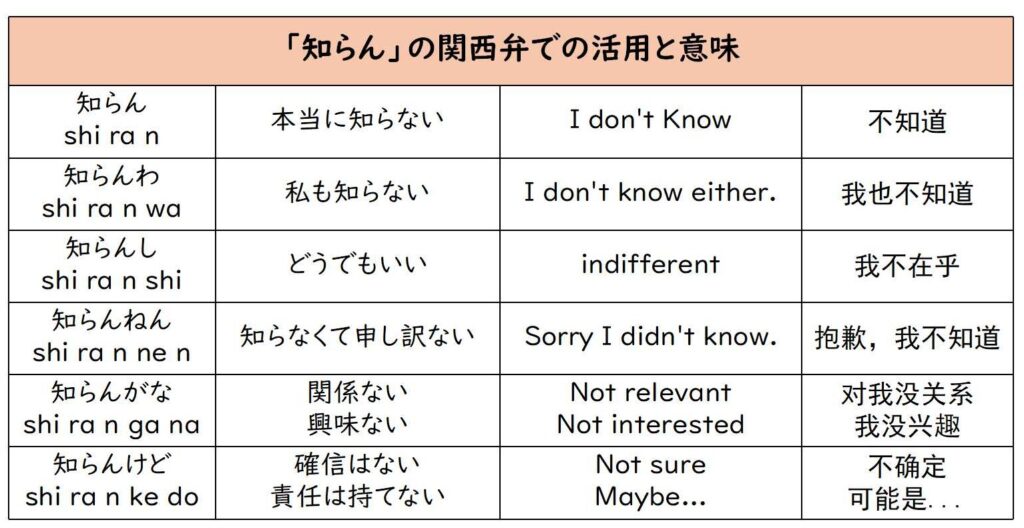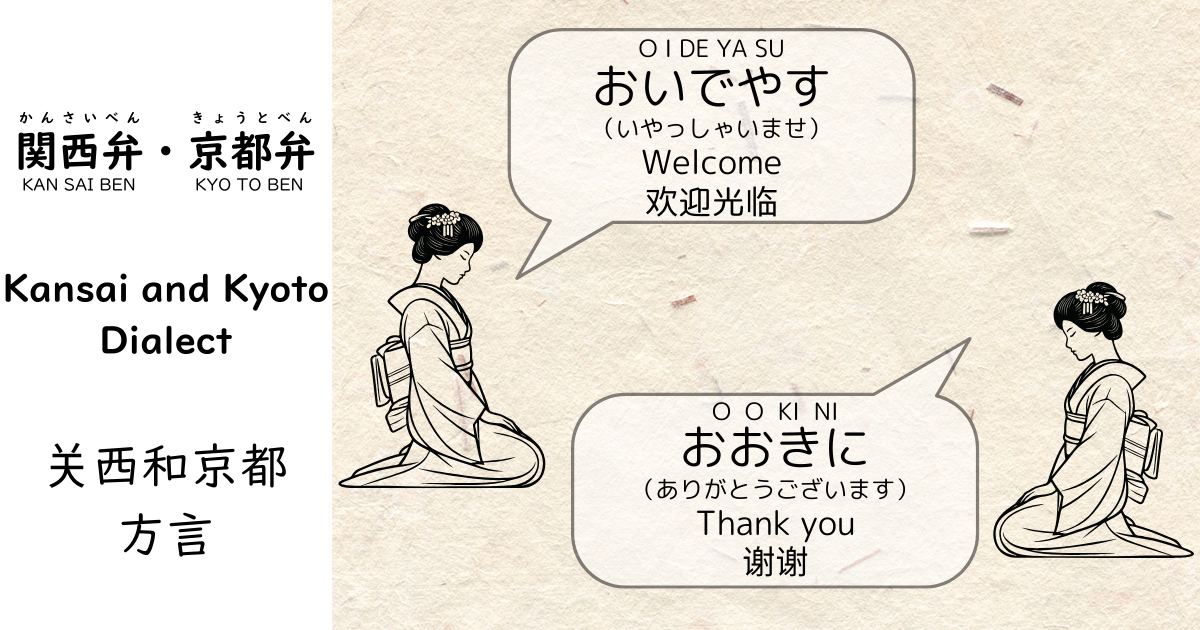
A Chinese friend asked me how to use ‘知らん shir a n’.
She saw a post online called ‘6 uses of shiran’.
But, translation tools just said ‘I don’t know’ each word.
Losing all nuance.
「知らん」「知らんわ」「知らんがな」「知らんけど」「知らんし」…。
“Shi ra n”“Shi ra n wa”“Shi ra ga na”“Shi ra n ke do”“Shi ra n shi”…。
We use them without thinking much at all.
But it’s hard to explain them clearly (lol).
My friend showed me the post.
I hought, ‘Ah, that makes sense!’
That’s the one.
*I added English and Chinese myself.

I would like to explain.
It in more detail based on this table.
1.shiran 知らん
‘I don’t know’.
It’s the simplest and most direct form.
Often used in casual replies.
Example:
「おかんどこ行った?」「知らん」 “Where's mom?”“I don't know.”
「Okan doko itta?」 「Shi ra n」
*Note: “Okan”means“mom”in Kansai dialect.
It's casual.But not gracefully.
2.shiran wa 知らんわ
‘I don’t know either’.
Adding “wa” .
Certainly makes the expression “I don’t know either.”
Example:
「おかんどこ行った?」「知らんわ」 “Where's mom?”“I don't know either.”
「Okan doko itta?」 「Shi ra n wa」
Depending on tone, it may sound cold.
It can show rejection.
「もう、あんたなんか知らんわ!」
「Mou,Anta nanka shi ran wa!」
“I don't care about that you anymore!”
The direct translation is “I don’t want to know you”.
But, what it really means?
It’s “Do whatever you want, it’s none of my business”.
Be careful with the tone of your voice!
3.知らんし(shi ra n shi)
‘Not my business’.
It’s often used to show disinterest.
Example:
「うちのおかんダイエット始めたらしいで」「知らんし」
「Uchi no okan daietto hajimeta rashii de」 「Shi ra n shi」
“My mom started a diet.”“I don't care.”
It also means:
There’s no way I could know.
Example:
「うちのおかん、どこ行ったか知ってる?」「いや、知らんし」
「Uchi no okan doko ittaka sitteru?」 「Iya,shi ra n shi」
“Do you know where mom went?”“No. Why would I know?”
4.知らんねん Shi ra n ne n
‘Sorry, I don’t know’.
「Shi ra n nen⤵」
It adds an apologetic feeling to “shiran”.
The ‘nen’ softens and conveys regret.
I never thought about it before.
Surprisingly, “nen” holds apology nuance.
It also stresses ‘I truly don’t know’.
It can express surprise or denial.
Example:
「ここにあった本、知らん?」「ほんまに知らんねん!」
「kokoni atta hon,shi ra n?」 「Honma ni shi ra n nen!」
“Where’s the book that was here?”“I really don’t know!”
5.知らんがな Shi ra n ga na
‘Not my concern’.
It’s similar to “shi ran shi” but stronger.
It shows strong disinterest or to threw in a punchline.
Example:
「うちのおかんダイエット始めたらしいで」「知らんがな!」
「Uchi no okan daietto hajimeta rashii de」 「Shi ra n ga na!」
“My mom started a diet.”“How would I care!。”
Commonly used when teasing or joking.
Often said in Kansai-style punchlines.
6.知らんけど Shi ra n ke do
‘I’m not sure though’.
It adds uncertainty to what you say.
It was in the 2022 new word awards top 10.
Used to say vague things or joke lightly.
Example 1:「あんたのおかん、買い物でも行ったんちゃう?知らんけど。」
(Anta no okan,kaimono demo ittann to tyau? Shi ra n ke do)
“Maybe your mom went shopping. Not sure.”
Example 2:「今日は暑いな~。ハワイみたい。知らんけど。」
(Kyou wa atsui na. Hawai mitai. Shi ra n ke do)
“It's so hot, like Hawaii! Maybe, I dunno.”
→If you can spit back here.
“Don't you know that at all?”.
That would be perfect!!
7.知らんて Shi ra n te
‘I said I don’t know!’
Used when asked the same thing again.
Example:
「これ、あんたの靴下ちゃうの?」「何回聞くねん。知らんて!」
(Kore, anta no kutusita tyau no?) (nan kai kiku nen. Shi ra n te!)
“Isn't this your sock?”“How many times ask me? I said I don't know!”
‘I heard it for the first time’.
Example:
「さっき言うたやん」「知らんて!」
(Sakki iuta yan) (Shi ra n te!)
“I already told you!”“I've never heard of it before!”
8.知らんで Shi ra n de
‘I don’t know what’s gonna happen to you’.
Used to warn or caution lightly.
It implies ‘I’m not responsible anymore’.
Example:「はよ行きや!知らんで!」
(Hayo iki ya! Shi ra n de!)
“Hurry up and go.
If you're late, I'm not responsible.”
9.知らん、知らん(shi ra n, shi ra n)
‘I really don’t know’.
Repeating shows strong denial.
Example:
「何か隠してない?」「知らん!知らん!」
(Nani ka kakushite nai?) (Shi ra n!Shi ra n!)
“Are you hiding something?”“I really don't know!”
‘Kansai people love to repeat short words’.
‘Akan, Akan’ → ‘No, no’.
‘Tabete, Tabete’ → ‘Eat, eat’.
It adds rhythm and emphasis.
I’ll explain more about this later!
Mastering ‘Shi ra n’ Nuances
Even if you say ‘shiran’, meanings vary.
Tone and context change the feeling.
That’s the charm of Kansai dialect.
It’s rich and detailed in expression.
If you master these uses,
you’ll enjoy Kansai conversations more!
Shiran kedo (I’m not that sure lol).
If you liked this,
you may also enjoy ‘Soya nen’ expressions


コメント